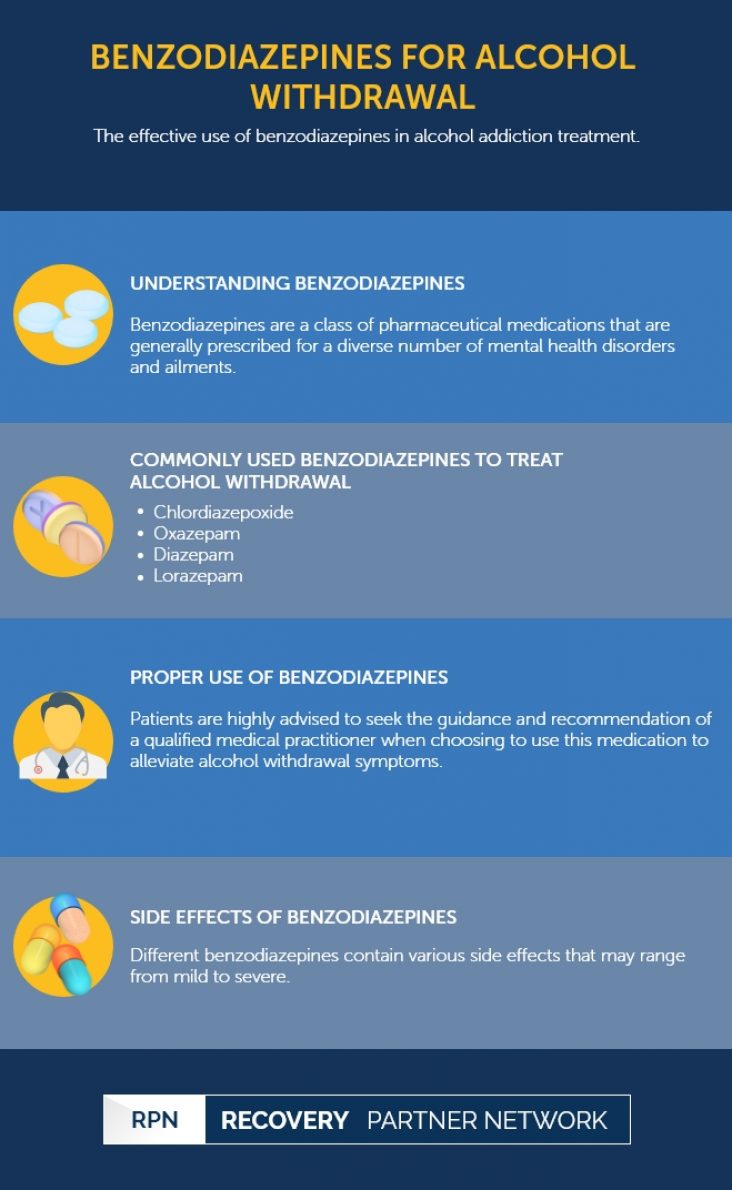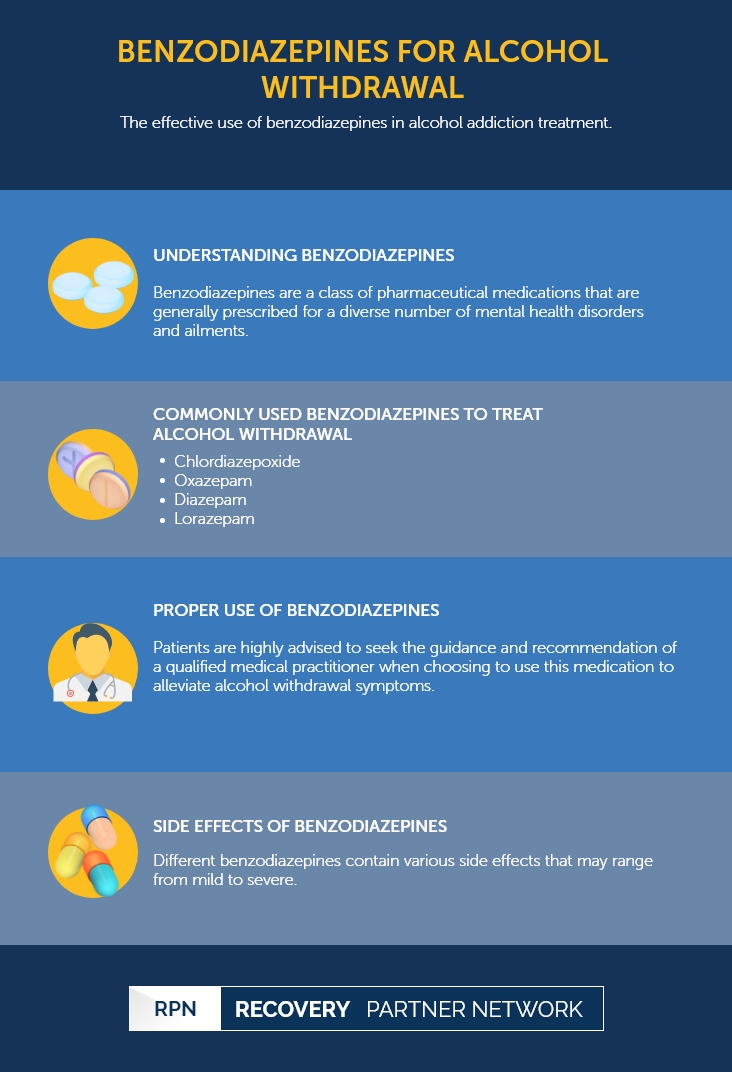The effective use of benzodiazepines in alcohol addiction treatment.
Benzodiazepines for Alcohol Withdrawal
Benzodiazepines for Alcohol withdrawal | Table of Contents
Understanding Benzodiazepines
Benzodiazepines are a class of pharmaceutical medications that are generally prescribed for a diverse number of mental health disorders and ailments. Benzodiazepines function by depressing the central nervous system to a certain degree and, as a result, induce sleepiness and relaxation.
Benzodiazepines attach themselves to neurons called GABA receptors in the brain. This helps slow down the overactive nerve impulses in the body and significantly decreases the brain’s output of other neurotransmitters like Serotonin, Norepinephrine, acetylcholine, and dopamine. These neurotransmitters are essential for:
- Memory
- Alertness
- Muscle tone and co-ordination
- Heart rate
- Emotional responses
- endocrine secretions
- Blood pressure
FAQ
- What is delirium tremens?
- How long does benzo rebound anxiety last?
- Which is the least potent benzodiazepine?
Delirium tremens is a severe side effect of alcohol withdrawal that often manifest three days into withdrawal. This condition generally affects those with severe alcohol addiction over a period of ten years or more.
Depending on the half-life of the drug, rebound anxiety may occur within 1 to 4 days of discontinuation.
Librium is considered to be the least potent benzodiazepine.
Benzodiazepines for Alcohol Withdrawal
Prolonged alcohol abuse changes the way the brain functions. Over time a patient’s brain starts to rely upon the chemical changes made by alcohol consumption. This stage is referred to as the formation of dependence. The severity of a patient’s dependency relies on the duration and severity of alcohol addiction. Abrupt cessation of alcohol consumption during this stage can result in the development of intense Alcohol Withdrawal Syndrome (AWS).
Alcohol withdrawal symptoms may include:
- Seizures
- Restlessness
- Hallucinations
- Nightmares
- Heart palpitations
- Vomiting
Due to the severity of alcohol withdrawal, patients are prescribed various benzodiazepines to help alleviate certain symptoms of AWS.
AWS symptoms managed by benzodiazepines may include:
- Nausea and vomiting
- Irritability
- Chills and sweats
- Seizures and tremors
- Difficulty sleeping and restlessness
- Headaches
- Anxiety
- Panic attacks
- Pain
Commonly Used Benzodiazepines to Treat Alcohol Withdrawal
Librium, the brand name of chlordiazepoxide, was the first benzodiazepine to be synthesized in the 1950s. Librium is classified as a Schedule IV controlled drug under the Controlled Substances Act and is commonly used as a short-term treatment for anxiety disorders. It is also prescribed as a medication to relieve the effects of acute alcohol withdrawal. Similar to other benzos, Librium can also be used to relieve seizures, insomnia, muscle tension, and Irritable Bowel Syndrome (IBS).
Oxazepam is used to relieve anxiety and acute alcohol withdrawal. It functions by improving the effects of a certain natural substance in the body known as GABA.
Valium is a long-acting benzodiazepine widely used in the management of anxiety, muscle spasms, and seizures. It is also used to alleviate the distressing effects of alcohol withdrawal. Valium is a prescription medication that is consumed orally in the form of a tablet.
Ativan is a long-acting benzodiazepine used for the management of anxiety disorders and certain forms of epilepsy and insomnia. Ativan is one of the most potent benzos available today in the US market. Ativan is also used to help ease and reduce extreme withdrawal effects during alcohol detoxification.
Proper Use of Benzodiazepines
Prolonged use of benzodiazepines can lead to a variety of adverse effects, including addiction. Since certain benzodiazepines induce adverse reactions when consumed in conjunction with other medications, patients are highly advised to seek and follow the guidance and recommendation of a qualified medical practitioner when choosing to use this medication to alleviate alcohol withdrawal symptoms. This process should ideally be performed at an inpatient or outpatient treatment facility under the supervision of medical professionals.
The type of benzodiazepine administered and how it is used can differ based on a variety of variables, including:
- The setting of the use
- The extent of alcohol addiction
- The symptoms that arise during detoxification
Benzodiazepines are generally used in three ways
- Fixed dosage not changed depending on the intensity of symptoms
- Particularly suited to mild symptoms
- Ideal for outpatient recovery
- Dosage is dependent on the patient’s pain rating (Increased dosage during higher levels of pain)
- Suitable for moderate to severe symptoms
- May only be used under strict medical observation
- Only used at an inpatient recovery facility
- Uses long-acting benzodiazepines that remain in the bloodstream for a few days
- Most effective at minimizing seizures
- Only used at an inpatient facility to allow monitoring
Side Effects of Benzodiazepines
Different benzodiazepines contain various side effects that may range from mild to severe. However, these effects may complicate the process as benzodiazepines mimic the signs of Alcohol Withdrawal Syndrome, making it impossible to differentiate between the two.
Some of the typical side effects of benzodiazepines are:
- Nausea and vomiting
- Constipation and memory loss
- Change in appetite
- Drowsiness and sedation
- Confusion and light headedness
- Difficulty maintaining balance
- Tiredness
- Sexual dysfunction
- Weight gain
- Constipation
Less common but adverse side effects of Benzodiazepines include:
- Jaundice
- Seizures
- Suicide
- Addiction
- Withdrawal
- Movement disorders
- Respiratory issues
- Increased and decreased heart rate
- Fainting
- Reactions with other medications
Benefits of Benzodiazepine
- Benzodiazepines include a wide range of medications that provide options for patients with different requirements.
- Help counteract the most harmful and severe symptoms of alcohol withdrawal, particularly pain and seizures.
- Fewer and less severe side effects in comparison to other forms of alternative medications.
- Help patients safely undergo the detoxification process and decrease their chance of a relapse.
Recovery Partner Network
We aim to educate and empower. If you feel our library of resources does not cover your specific need, reach out to us, and we would be happy to help.
STATISTICS
© Copyright 2026


